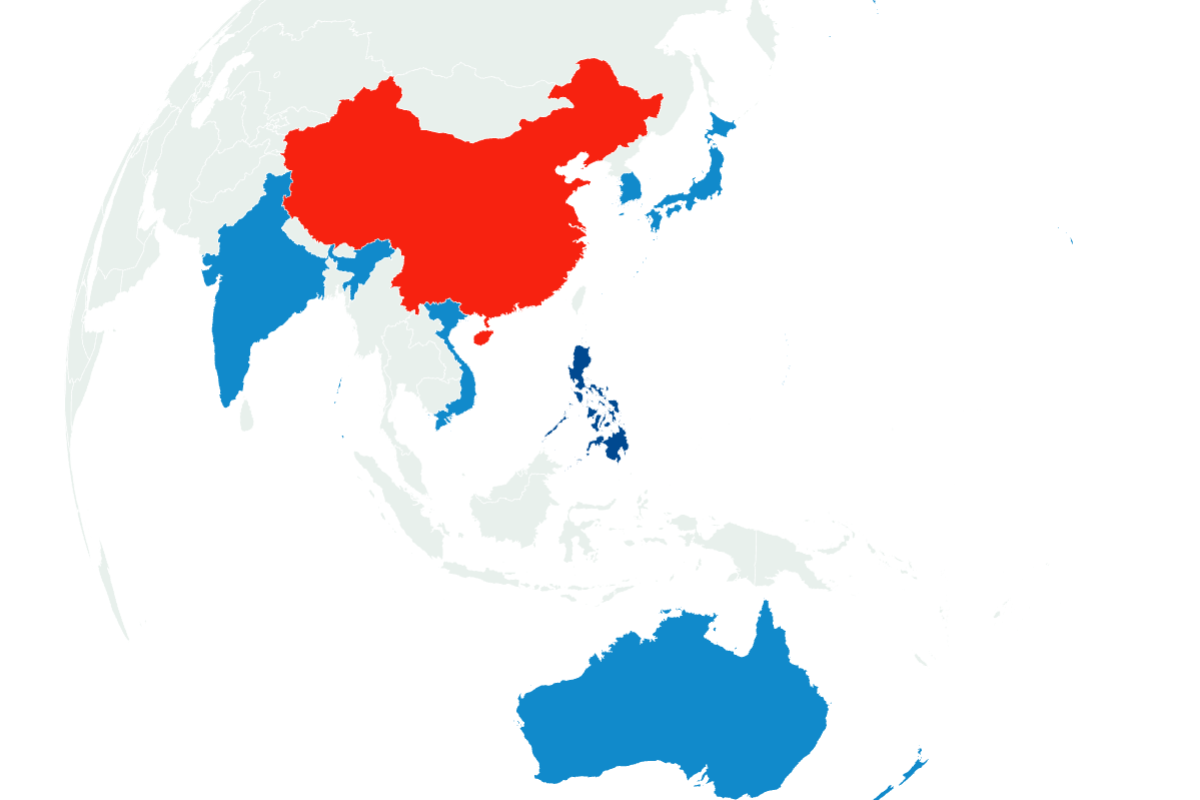A growing network of military partnerships is reshaping the security dynamics in Asia as countries around the South China Sea and the western Pacific enhance cooperation in response to China's expansive maritime claims and assertive actions. A Newsweek map highlights these emerging links between countries that, while not all formally allied, are drawing closer through practical security arrangements such as weapons deals, access agreements, and joint defense initiatives. Philippines at the Center of a Regional Shift At the heart of this shift is the Philippines, which faces persistent Chinese incursions into its exclusive economic zone (EEZ).
General Romeo Brawner Jr., head of the Philippines' Joint Chiefs of Staff, reported an average of 286 Chinese vessels operating daily last year within the EEZ, up from 190 in 2021. In response, President Ferdinand Marcos Jr.

has sought to strengthen external partnerships. Japan has stepped up military assistance , providing patrol vessels, radar systems, and coastal surveillance equipment through its Official Security Assistance framework. In December 2024, Tokyo announced an additional 1.
6 billion yen (approximately $10.65 million) in maritime aid, one day after Manila accused Chinese forces of harassment at sea. An agreement to allow reciprocal military visits, ratified by the Philippine Senate in December 2024, awaits approval by Japan's legislature.
The Philippines has also expanded its partnership with South Korea, which recently elevated relations to a strategic level. Manila has ordered two missile corvettes from Hyundai Heavy Industries, with the first expected to be delivered by 2025 and the second by 2026. India has emerged as a defense partner in Southeast Asia.
After supplying BrahMos cruise missiles to the Philippines—the first such export of the jointly developed India-Russia system—Vietnam is reportedly close to finalizing a $700 million deal for the same platform. The Philippines is also considering acquiring the U.S.
Army's Mid-Range Capability missile system, known as Typhon. A Typhon launcher, capable of firing Tomahawk missiles with a range of approximately 1,500 miles, was deployed to Luzon earlier this year, drawing sharp criticism from Beijing. New Openings for Australia and India Australia's relationship with the Philippines has expanded in recent years, evolving from a counterterrorism-focused partnership to one centered on territorial defense and maritime deterrence.
"The Philippines is not a traditionally close defense partner of Australia. Yet in the past five years, the relationship has significantly expanded," Euan Graham, acting director of defense strategy at the Australian Strategic Policy Institute, told Newsweek . "It's now focused much more on territorial defense and supporting Manila's efforts to resist maritime coercion by China.
" He noted that Australia has visiting forces and logistics support agreements with Manila and that Philippine troops now regularly join joint exercises—including with U.S. and Japanese units.
"The Philippines has grown in strategic importance for Australia, given its proximity to the South China Sea and Taiwan," he said. "And Manila is a more cooperative partner now than many of Canberra's traditional partners in Southeast Asia." Wider Realignments While China's posture in the South China Sea remains the most visible flashpoint, its activities elsewhere are also drawing scrutiny.
In March 2024, China announced new territorial baselines in the Gulf of Tonkin, prompting rare public criticism from Vietnam, which called on China to respect international law and the rights and interests of other countries. Meanwhile, U.S.
coordination with both Japan and South Korea has intensified in the face of North Korea's continued weapons testing. Longstanding tensions between Tokyo and Seoul over colonial history and disputed islands have not blocked expanding trilateral cooperation—evident in intelligence-sharing and increasingly regular joint military drills. Newsweek reached out to the Chinese, Japanese, and Australian foreign ministries and the Philippine armed forces with written requests for comment -.
Top

Map Shows New Alliance Growing on China's Doorstep

Countries across Asia are quietly stitching together defense ties in a web of cooperation around China.











